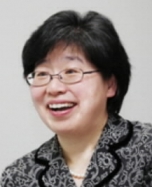
Formerly, paternal grandmothers were addressed just as “grandmother."; mother’s mothers were addressed "maternal grandmother.."
But since some time, the "maternal" in front of maternal grandmother." was omitted, but instead the ":paternal." was inserted in front of "grandmother."
If they live in the same district, they would be called "Joogong (apartment) grandmother." or "Xi (apartment) grandmother.."
In the background of the change in status of paternal and maternal grandmothers definitely lies an abrupt weakening in our patrilineal kinship-oriented relationship.
Voices concerning the advent of matriliny instead of patriliny are heard frequently, but there is no affirmative possibility that it will be replaced by matriliny which follows the mother in consanguinity. Instead, a “Korean biliny” is discharged in which patriliny will be sustained obligatorily while in practical life, matriliny will be strongly projected.
It is true that since older days, obligations and rituals were patrilineal-oriented and emotional support and receptive exchange were matrilineal-oriented.
Adding to this, the reality that the function of nurturing and provision which are the crux of the family community runs centrally around the wives’ homes is the background behind the catalyzing of the recent weakening of patriliny.
Moreover, in a situation in which a son supposedly cares for his aged parents outwardly but in reality it is the daughter-in-law’s obligation, the recognition that it is better to depend on one’s own daughter to whom one can talk straight than an uncomfortable daughter-in-law is spreading.
The problem is, because of the Korean "quickly quickly" temperament, between the reality of the abruptly changing family relationships with standards regulating new ones and values that pertain to biliny shows a prominent delay which spreads a panic state in which it is no one’s fault but at the same time none is satisfied.
Amidst of that, it is deplorable that individual families each command “accidental pluralism” which diffuses selfishness that asserts one to take care of one’s parents but not one’s spouse, and indifference that it is more comfortable to neither give nor receive.
But there are noticeable novel attempts. Stories of people who served New Year in the first son’s house and Chuseok in the second’s or whose two married daughters decided to consequently come to their maiden house first on holidays . It is not such a difficult decision if each care for each other a little more and fill their hearts fully.
After four years, the number of old aged generations over age 65 will increase and the society will enter into an aging society and sprint towards a five-generation society in which great-great-grandparents and their great-great-grandsons coexist in one.
In an evident situation in which people will coexist with various grandparents beyond the matter of patriliny or matriliny, affluent creativity and insight regarding how to build on standards and values encircling the boundary of family relationships are desperate.
*Professor Hahm In-Hee received a master’s degree from Ewha Womans Univerisity and has a Ph.D degree from Emory University Graduate School. She is currently a professor at Ewha teaching Sociology.

